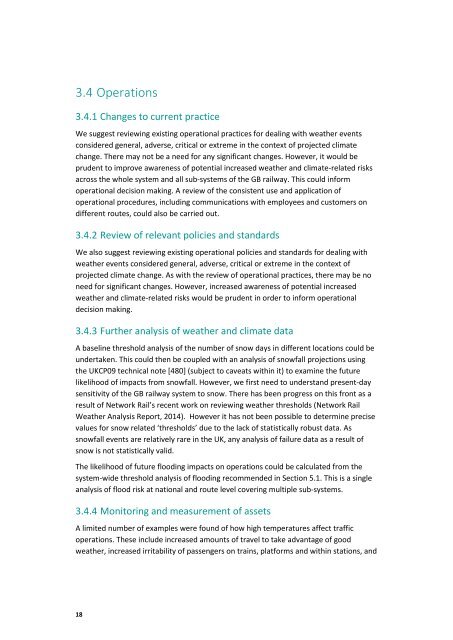Tomorrow's Railway and Climate Change Adaptation Final Report
2016-05-T1009-final-report
2016-05-T1009-final-report
You also want an ePaper? Increase the reach of your titles
YUMPU automatically turns print PDFs into web optimized ePapers that Google loves.
3.4 Operations<br />
3.4.1 <strong>Change</strong>s to current practice<br />
We suggest reviewing existing operational practices for dealing with weather events<br />
considered general, adverse, critical or extreme in the context of projected climate<br />
change. There may not be a need for any significant changes. However, it would be<br />
prudent to improve awareness of potential increased weather <strong>and</strong> climate-related risks<br />
across the whole system <strong>and</strong> all sub-systems of the GB railway. This could inform<br />
operational decision making. A review of the consistent use <strong>and</strong> application of<br />
operational procedures, including communications with employees <strong>and</strong> customers on<br />
different routes, could also be carried out.<br />
3.4.2 Review of relevant policies <strong>and</strong> st<strong>and</strong>ards<br />
We also suggest reviewing existing operational policies <strong>and</strong> st<strong>and</strong>ards for dealing with<br />
weather events considered general, adverse, critical or extreme in the context of<br />
projected climate change. As with the review of operational practices, there may be no<br />
need for significant changes. However, increased awareness of potential increased<br />
weather <strong>and</strong> climate-related risks would be prudent in order to inform operational<br />
decision making.<br />
3.4.3 Further analysis of weather <strong>and</strong> climate data<br />
A baseline threshold analysis of the number of snow days in different locations could be<br />
undertaken. This could then be coupled with an analysis of snowfall projections using<br />
the UKCP09 technical note [480] (subject to caveats within it) to examine the future<br />
likelihood of impacts from snowfall. However, we first need to underst<strong>and</strong> present-day<br />
sensitivity of the GB railway system to snow. There has been progress on this front as a<br />
result of Network Rail’s recent work on reviewing weather thresholds (Network Rail<br />
Weather Analysis <strong>Report</strong>, 2014). However it has not been possible to determine precise<br />
values for snow related ‘thresholds’ due to the lack of statistically robust data. As<br />
snowfall events are relatively rare in the UK, any analysis of failure data as a result of<br />
snow is not statistically valid.<br />
The likelihood of future flooding impacts on operations could be calculated from the<br />
system-wide threshold analysis of flooding recommended in Section 5.1. This is a single<br />
analysis of flood risk at national <strong>and</strong> route level covering multiple sub-systems.<br />
3.4.4 Monitoring <strong>and</strong> measurement of assets<br />
A limited number of examples were found of how high temperatures affect traffic<br />
operations. These include increased amounts of travel to take advantage of good<br />
weather, increased irritability of passengers on trains, platforms <strong>and</strong> within stations, <strong>and</strong><br />
18


